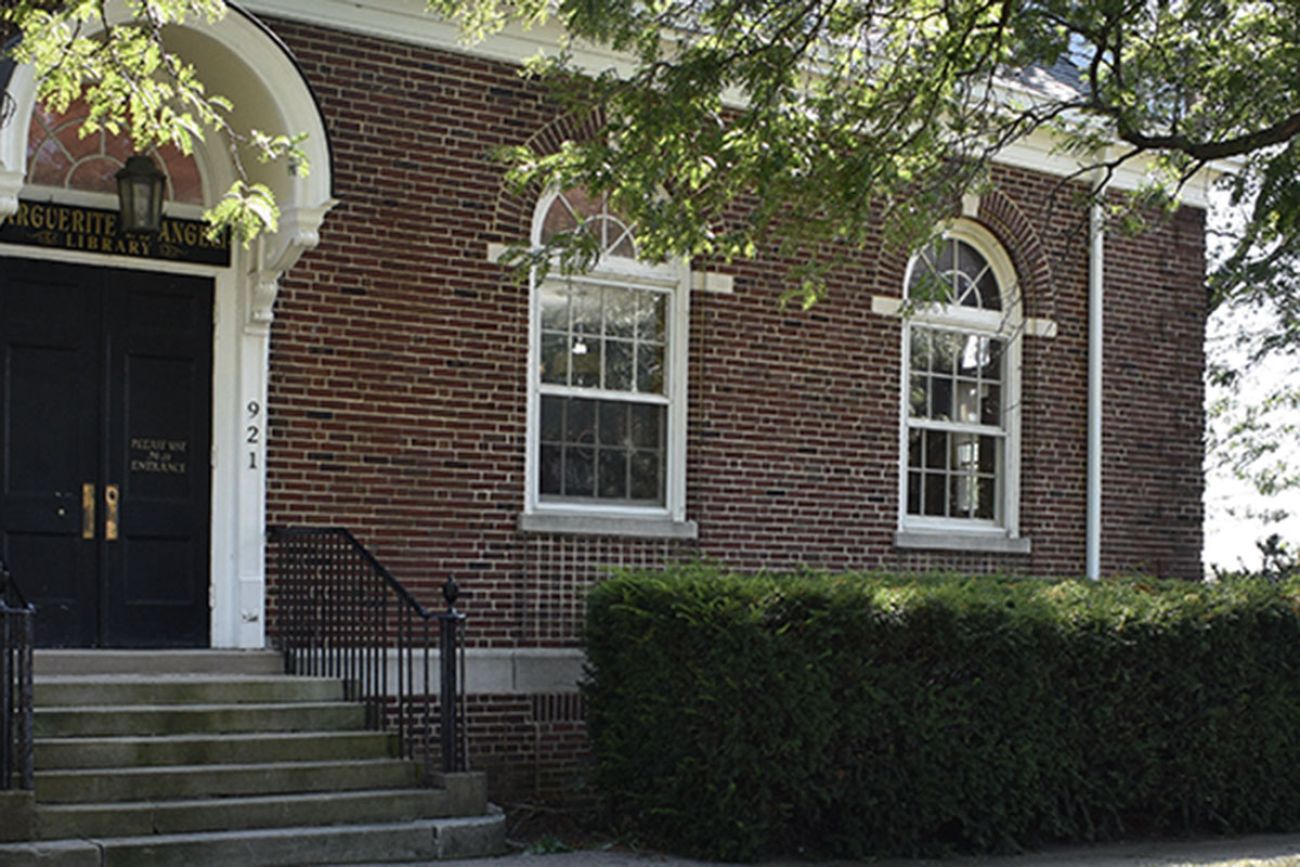Experts cast doubt that Lapeer librarian can be charged over LGBTQ book

- The Lapeer County prosecutor is weighing charges against library officials for carrying an LGBTQ book that depicts sex acts
- At dispute is a graphic novel that addresses challenges relating to coming out to family and society
- Legal experts were quick to poke holes in the possible case
March 20: The fate of ‘Gender Queer’ now in the hands of Lapeer librarian
Legal experts are criticizing Lapeer County Prosecutor John Miller’s threat to consider filing criminal charges against officials at a local public library over a graphic novel that includes drawings of sex acts.
It’s believed to be the first time a Michigan prosecutor has raised the specter of criminal charges in a culture war battle over a controversial book, and Miller would face an uphill battle proving those charges in court, several attorneys and law school professors told Bridge Michigan.
“The First Amendment extends a broad power in permitting authors to write books about subjects that may make some people very uncomfortable,” said Larry Dubin, emeritus law professor at the University of Detroit Mercy. “To threaten criminal charges against the judgment of a librarian who determines that a book is appropriate for viewing by the public is dangerous and perhaps even outrageous.”
Related:
- Michigan prosecutor mulls charging Lapeer library over LGBTQ book
- Michigan GOP official: Shut down ‘by force’ public library with LGBTQ books
- After LGBT book spat, Michigan family gives $100K to library they haven’t seen
At the center of the controversy in this conservative county in Michigan’s thumb is a book titled “Gender Queer: A Memoir,” a graphic novel telling the story of the author coming to terms with being nonbinary, including his confusion of adolescent crushes, and grappling with how to come out to family and society. What has propelled the book to the top of banned book lists are drawings of sex acts included in the book.
Bridge spoke to four legal experts about Miller’s suggestion that library officials could be charged with a violation of criminal code 750.145a, a felony punishable by up to four years in prison.
The law in question is often associated with police sting operations of adults who prey on minors, barring enticing anyone under 16 "to commit an immoral act, to submit to an act of sexual intercourse or an act of gross indecency or to any other act of depravity or delinquency.”
Miller argues that the book’s depictions of sex acts by two males, who the prosecutor described as “pre-pubescent,” could serve to “entice” underage teens to engage in sexual activity.
At the Lapeer library, “Gender Queer” has been shelved in the adult section, but anyone can check it out. In some libraries, “Gender Queer” has been housed on shelves meant for young adult readers.
“While I hope not to prosecute someone over this book, I feel it’s part of the community’s decision,” Miller said. “This isn’t about LGBTQ, this is about the exploitation of children.”
Miller tried to walk back his statements to Bridge on Tuesday, telling CBS Detroit his remarks were “completely blown out of proportion
"My goal is to try and educate the public (on) how this material fits into some of the laws into the state of Michigan, not to threaten someone with prosecution. That's not where we are at," he told CBS.
Meanwhile, library director Amy Churchill said Wednesday that after Bridge first reported the controversy, she has received multiple offers of free legal services if she were to be charged, including from the American Civil Liberties Union. “The response has been overwhelmingly positive,” Churchill said.
Arthur Weiss, president of the Criminal Defense Attorneys of Michigan, an advocacy group, said criminal charges against a librarian over a book likely wouldn’t hold up in court, but “you never say never. To predict what a (judge) is going to do is difficult.
“There are a number of statutes on the books that are rather broad and have vague language, and prosecutors try to get certain conduct within the confines of those statutes,” Weiss said. “Sometimes jurists agree, sometimes they don’t.”
The Detroit and Michigan chapters of the National Lawyers Guild released a statement Wednesday blasting Miller’s consideration of criminal charges over a library book.
“We are deeply concerned by Mr. Miller’s abuse of his office to intimidate the Library staff and curate the library collections according to his personal beliefs,” the statement said. “To use a criminal statute designed to prosecute pedophiles in this way demonstrates a deep disrespect for the law.”
Miller told Bridge this week he believed most people would consider the book obscene in his conservative county. “My job is to take a position that protects our innocent and our youth. And if this isn’t child sexual abusive material … it borders on it.”
But Weiss said he doubted the book would meet the U.S. Supreme Court’s longstanding obscenity standard. In its 1973 ruling in Miller v. California, the high court laid out a difficult, three-pronged test for whether a work is obscene and not worthy of First Amendment protection. Prosecutors must meet all three elements, which are:
- That, to the average person, applying contemporary community standards, the work, taken as a whole, appeals to the “prurient interest” (which the court later defined as “having a tendency to excite lustful thoughts.”
- That the work depicts sexual conduct in a patently offensive way
- And that the work, taken as a whole, lacks serious literary, artistic, political or scientific value
Weiss said he was skeptical the prosecutor could meet that standard if the book had been vetted by library officials who, by library policy, are supposed to make decisions on book purchases.
“To threaten a librarian with the penitentiary for doing their job … is offensive,” Weiss said.
Churchill, the library director, told Bridge “Gender Queer” was purchased last fall at the request of a library patron. In 2020, the book won an Alex Award from the American Library Association for books published for adults with crossover appeal to readers age 12-18. The book is in the collections of numerous Michigan libraries, and has been the subject of controversy across the state.
In the Lapeer library, “Gender Queer” is shelved in the adult book section.
Sara Habbo, president of the Detroit and Michigan chapter of the National Lawyers Guild, told Bridge in an interview that prosecutors can bring any charges they like, and “judges have the leeway to interpret the law.
“If their personal beliefs align with the Lapeer prosecutor’s office, they’re likely to take that argument and allow the case to move forward.
“Just reading the (criminal) code, it shouldn’t apply (to books in a library) but if it does, they need to go through every book in the library” to look for other examples of sexually explicit photos, drawings or descriptions.
One example: the Lapeer Library carries a copy of “The Joy of Sex,” which also includes illustrations of sex acts, though they are heterosexual sex acts.
Michael McDaniel, associate dean emeritus at Western Michigan University’s Thomas M. Cooley Law School, said the statute Miller cites relates to “immoral acts or purposes related to sexual activity.”
“Simply having a book on the shelves that has to do with sexual orientation has nothing to do with sexual activity,” he said.
“This is going to fall as a matter of law,” McDaniel said, but “It’s having a chilling effect on a process” by making libraries hesitate to offer controversial books to the public.
“This sounds like bullying, which is not the role of the prosecutor.”
Miller, who became prosecutor in January after being elected to the post in November, told Bridge he plans to speak at a Thursday meeting of the Lapeer District Library Board to urge board members to remove “Gender Queer” from its collection.
That 5:30 p.m. meeting has been moved from the library to the Lapeer Center Building, in the city of Lapeer, to accommodate what is expected to be a large crowd.
See what new members are saying about why they donated to Bridge Michigan:
- “In order for this information to be accurate and unbiased it must be underwritten by its readers, not by special interests.” - Larry S.
- “Not many other media sources report on the topics Bridge does.” - Susan B.
- “Your journalism is outstanding and rare these days.” - Mark S.
If you want to ensure the future of nonpartisan, nonprofit Michigan journalism, please become a member today. You, too, will be asked why you donated and maybe we'll feature your quote next time!




